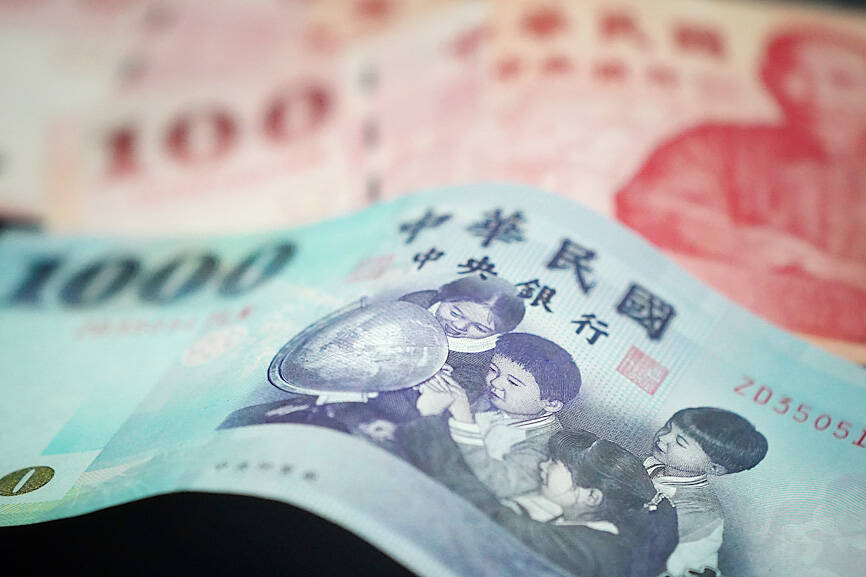Average monthly wages in the local industrial and services sectors in February rose 3.02 percent year-on-year to NT$47,296, while total wages — including bonuses and overtime pay — dropped 28.74 percent to NT$58,182, skewed by the timing of the Lunar New Year holiday, the Directorate-General of Budget, Accounting and Statistics (DGBAS) said yesterday.
Despite the sharp annual decline in total compensation, the data indicate a continued upward trend in Taiwanese workers’ wages, DGBAS Census Department Deputy Director Tan Wen-ling (譚文玲) said.
The timing of the Lunar New Year holiday — which fell mainly in January this year, but entirely in February last year — contributed to the discrepancy, she added.

Photo: CNA
In the first two months of the year, average real regular wages rose 0.81 percent year-on-year to NT$43,380 after adjusting for inflation, the fastest growth in four years, Tan said.
Real total wages also grew 0.85 percent to NT$154,709, the second-highest increase over the same period, she said.
This is the 11th consecutive month in which wage growth outpaced inflation, Tan said.
Median regular wages — considered a more accurate reflection of typical pay, as they are not skewed by extremely high or low wages — rose 2.89 percent year-on-year to NT$37,986 in February, the DGBAS said. The figure was NT$38,062 in the first two months of this year, up 2.93 percent year-on-year, it said.
Meanwhile, the average overtime hours in the industrial and service sectors in February hit 8.4 hours, up 0.5 hours from a year earlier, the agency said.
In addition, overtime hours in the manufacturing sector reached 16.1 hours in February, extending a nine-month streak of positive growth, while the electronics components industry reported 26.9 overtime hours, the second-highest figure on record, the agency added.
The increase was driven in part by continued gains among Taiwanese technology firms, which have benefited from the development of artificial intelligence by major US technology giants, Tan said.
However, it is difficult to determine whether the rise in overtime hours and manufacturing activity was driven by front-loading of shipments, she added.
In the first two months, the average overtime hours in the industrial and service sectors were 8.5 hours, up 0.5 hours from the same period last year, the agency's data showed.
The DGBAS also estimated that average year-end bonuses in the local industrial and services sectors will rise to 1.72 months of regular salary this year, with the financial and insurance sector receiving the highest bonuses, averaging 3.74 months of regular salary.
The manufacturing sector followed with 2.17 months, trailed by the transportation and warehousing sector at 1.97 months and the real estate industry at 1.92 months, the agency said.

The Eurovision Song Contest has seen a surge in punter interest at the bookmakers, becoming a major betting event, experts said ahead of last night’s giant glamfest in Basel. “Eurovision has quietly become one of the biggest betting events of the year,” said Tomi Huttunen, senior manager of the Online Computer Finland (OCS) betting and casino platform. Betting sites have long been used to gauge which way voters might be leaning ahead of the world’s biggest televised live music event. However, bookmakers highlight a huge increase in engagement in recent years — and this year in particular. “We’ve already passed 2023’s total activity and

Nvidia Corp CEO Jensen Huang (黃仁勳) today announced that his company has selected "Beitou Shilin" in Taipei for its new Taiwan office, called Nvidia Constellation, putting an end to months of speculation. Industry sources have said that the tech giant has been eyeing the Beitou Shilin Science Park as the site of its new overseas headquarters, and speculated that the new headquarters would be built on two plots of land designated as "T17" and "T18," which span 3.89 hectares in the park. "I think it's time for us to reveal one of the largest products we've ever built," Huang said near the

China yesterday announced anti-dumping duties as high as 74.9 percent on imports of polyoxymethylene (POM) copolymers, a type of engineering plastic, from Taiwan, the US, the EU and Japan. The Chinese Ministry of Commerce’s findings conclude a probe launched in May last year, shortly after the US sharply increased tariffs on Chinese electric vehicles, computer chips and other imports. POM copolymers can partially replace metals such as copper and zinc, and have various applications, including in auto parts, electronics and medical equipment, the Chinese ministry has said. In January, it said initial investigations had determined that dumping was taking place, and implemented preliminary

Intel Corp yesterday reinforced its determination to strengthen its partnerships with Taiwan’s ecosystem partners including original-electronic-manufacturing (OEM) companies such as Hon Hai Precision Industry Co (鴻海精密) and chipmaker United Microelectronics Corp (UMC, 聯電). “Tonight marks a new beginning. We renew our new partnership with Taiwan ecosystem,” Intel new chief executive officer Tan Lip-bu (陳立武) said at a dinner with representatives from the company’s local partners, celebrating the 40th anniversary of the US chip giant’s presence in Taiwan. Tan took the reins at Intel six weeks ago aiming to reform the chipmaker and revive its past glory. This is the first time Tan